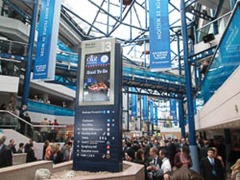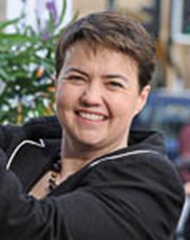Tories gear up for 2015
 Tory morale rose during their annual conference in Birmingham but UKIP remains an electoral risk and some members are thinking about a post-Cameron leadership. Peter Cheney reports.
Tory morale rose during their annual conference in Birmingham but UKIP remains an electoral risk and some members are thinking about a post-Cameron leadership. Peter Cheney reports.
It was as if a cloud – purple and yellow in colour – was dampening spirits on the first day of this year’s Tory gathering. A parliamentary defection to UKIP and a ministerial resignation undermined David Cameron’s authority overnight but a fighting spirit soon took hold and the PM rounded off the gathering with a rousing electioneering speech.
Cameron would clearly be happy to consign the Lib Dems to the backbenches but UKIP’s rise could well hold him back from the long-desired outright majority next May. In full flow as he addressed North of England Tories, the PM recalled succeeding another defector (Shaun Woodward) and how the move had angered local members.
The fight was on to retake Rochester and Strood but one activist candidly admitted that UKIP had attracted many of the most active grassroots Tories. The silence about the Clacton by-election was widely viewed as a sign that the Tories had given up on winning that seat back.
“I think everyone is pretty buoyant,” Owen Paterson commented. “Okay, there’s big press stories about some people leaving but I’m absolutely clear that the only organisation that can resolve the long-term problems of the United Kingdom is the Conservative Party.”
The two defecting MPs were “very unwise” but he respected the fact that some people are cross, some people are disillusioned. We’ve got to convince them.” Paterson preferred to focus on the recent wins of conservative parties across the world: “When a robust conservative agenda is presented, small-c conservatives come out and vote for that proposal.”
Running down a corridor one night – and surrounded by a posse of aides – Boris grabbed the attention of everyone in earshot. He was the real star of the show for many members if only for “good entertainment,” as one said.
She was much more impressed by Heath Secretary Jeremy Hunt and Culture Secretary Sajid Javid. Both men had got on with their work and, unlike Michael Gove, did not create critical headlines.
The consensus among the media and members was that George Osborne and Theresa May were building their support bases for a future leadership election – potentially if the general election went badly next year.
The stereotype of a posh Etonian Tory doesn’t necessarily stand up to scrutiny. A campaign manager from a northern constituency was keen to highlight his MP’s comprehensive education. Welsh Secretary Stephen Crabb was brought up by a single mother on a council estate.
A Northern Ireland viewpoint was put forward by the local Conservatives and the business representatives but many more voices could have been heard. Indeed, many delegates had a genuine personal interest or at least a curiosity about how the province viewed its place in the UK. The conference offers a major opportunity for politicians and professionals, of all types, to lobby and build contacts.
Tailoring his message to the Northern Ireland Conservatives, Cameron reaffirmed their work and said that he wanted voters to have that choice “wherever they are in our United Kingdom.”
As before, Cameron was candid and relaxed when praising the British-Irish relationship. The journey to Flanders with Enda Kenny seemed to strike a particular chord with him in this time of centenaries. “In that appalling carnage,” he recalled, “many people from right across Ireland had signed up [and] fought so bravely and valiantly on the Western Front.”
Theresa Villiers was notably more confident as a speaker compared to last year. Speaking at the Champ Northern Ireland breakfast, she warned: “It is hard to see how the Executive could fund a corporation tax cut as well as meeting mounting bills to run a more expensive welfare system.”
Devolving corporation tax could provide “a major boost” to the private sector in the context of a wider package.
Differential rates for SMEs and large businesses were envisaged. More work was needed on capital allowances, R&D credits, intellectual property and calculating the block grant reduction – “one of the most difficult of all the issues to resolve.”
Villiers added that the block grant was 25 per cent higher than public spending levels in England. It was more important than ever to “reduce the running costs of government”.
Speaking to agendaNi, Villiers said of welfare reform: “We are remedying what we see as the serious flaws in the system that we inherited because too often, it did trap people in dependence. It failed in its design to serve [people].”
Northern Ireland Conservatives’ Chairman Harry Cullen spoke to agendaNi just after having a conversation with the PM. He informed Cameron that young people were increasingly disillusioned with local politics and the party needed to be confident about its message.
“We can park the union. It’s safe,” he stated. “What we have to do is employ our people, get a good education, a good health service and fix the economy.” He’s happy to take the long view and build the party up from its current level: 400 members in seven associations.
Cullen once ran the Conway Mill in West Belfast and was previously an Ulster Unionist. As for other parties, he recalls how the DUP rescued Gordon Brown in the 42-day detention vote: “Believe me, the Conservatives have long memories so, yes, he [Cameron] may need votes at a certain point in time but there will be no pacts.” Cullen acknowledges that UKIP’s European election campaign was well-financed but he views UKIP as populists who cannot deliver an EU referendum.
His conclusion: “Be active in your local area and make a contribution to the society we live in. It’s as simple as that because if you don’t, then we end up with what we have: the politics of fear as we have in Stormont that ends up in crisis after crisis after crisis.”
“We’ve just had the biggest, broadest conversation in our country about where our future lies,” Scottish Conservative leader Ruth Davidson reflected in an interview with agendaNi. “We want to have the levers of control in Scotland about some of the issues that relate to Scotland.” In particular, the Scottish Tories are pressing for the full devolution of income tax.
Davidson is proposing a collective body that would bring together representatives from the UK Parliament and all devolved legislatures. This would be have a formal to role “to discuss some of the areas of conflict and indeed sometimes congruence” as devolution develops.
“I was delighted by the real sense of relief and joy that the United Kingdom remains,” she said of the conference’s tone. “People understood that the rest of the country would be diminished if Scotland left and we would lose something of ourselves too. The number of goodwill messages that I’ve had since I’ve been here just shows how much the people of the rest of the UK care – and I thank them for that.”








